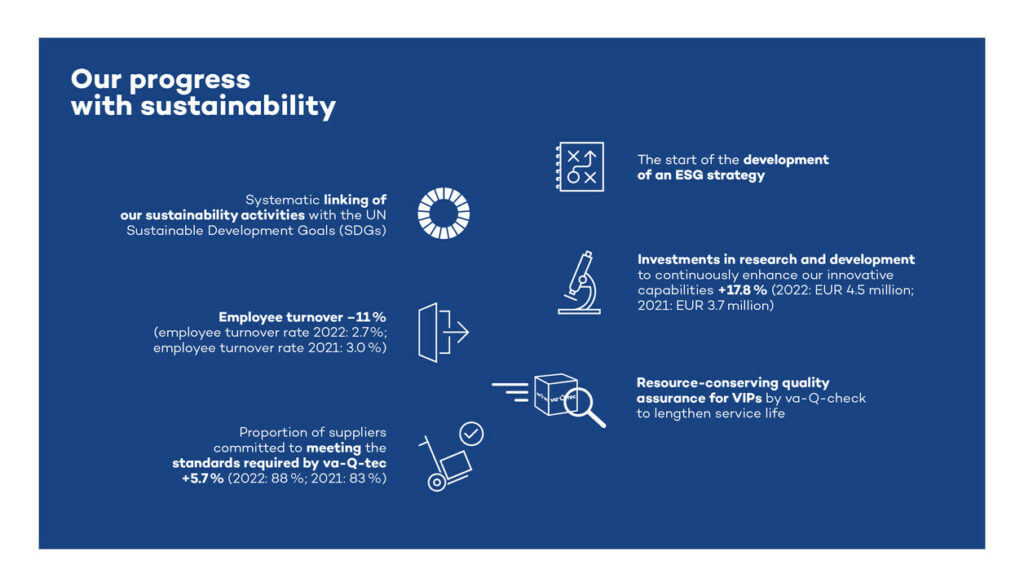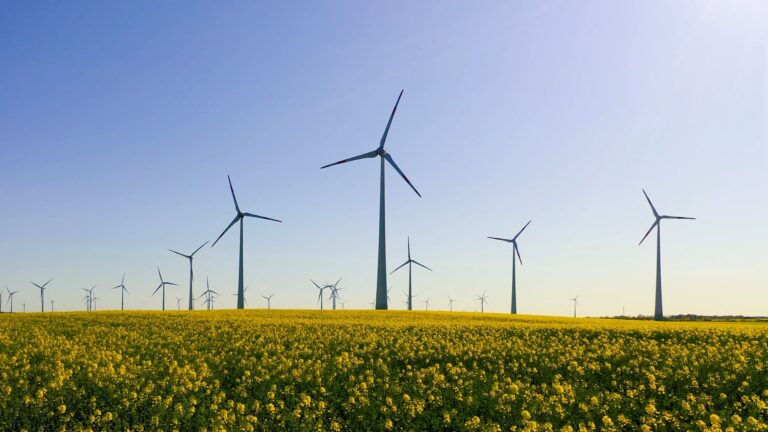
- In Germany, two-thirds of the nation’s energy is used for thermal processes, that is, for generating heat or cold.
- Against the backdrop of the energy crisis and advancing climate change, the topic of energy consumption and conservation is moving into the public spotlight.
- About one-third of thermal energy consumption can be easily saved with existing technologies.
Würzburg, 12 September 2023. Using thermal energy efficiently and economically has been va-Q-tec’s consistent goal for years and is reflected in all the products it has developed. Since the onset of the energy crisis, society has been driven to consider the topic of energy as well. The question now is how we can save as much energy as possible to reduce costs and protect the environment. Initially, seemingly small measures have a big effect in total: Using efficient thermal insulation can significantly reduce energy consumption in various areas of our daily life, such as in freight traffic. A proposal recently worked out by the EU envisions the use of longer trucks, so-called jumbo trailers, to save CO2 and energy. As a result, a higher load could be transported on the road using a similar energy expenditure. This is where vacuum insulation comes into play: An insulation of the cargo space would reduce the energy expenditure for refrigerated transportation while increasing the range of the jumbo trailers.
Sustainability drives technological progress
“The best kilowatt hour is the one that does not even have to be produced,” says Dr. Joachim Kuhn, CEO and founder of va-Q-tec. “With our products, we want to help waste as little energy as possible. We want to draw the attention of companies, politicians and consumers to the importance of vacuum insulation in various areas and show them how it can help drive the heating turnaround and save costs in the process.”
The technology of vacuum insulation, which was recently honored with Europe’s oldest innovation award, the Rudolf Diesel Medal, uses the same principle as a thermos. Highly effective insulation is achieved by creating an airless space, a vacuum, between two layers of materials. This technology makes it possible to significantly reduce heat or cold loss in buildings, household appliances, heating systems, and vehicles. At the same time, the high-performance insulation makes do with very little space: The panels insulate up to ten times better than conventional materials of the same thickness, so that two millimeters of vacuum insulation replace up to 20 millimeters of conventional insulation material. That is why vacuum insulation panels (VIPs) are used wherever very good insulation is required in a limited space.
Energy-saving potential at home: exterior insulation and hot-water tanks
According to a calculation by the Consumer Association of Germany (Verbraucherzentrale Deutschland), one-third of the heat in both older and unrenovated homes is lost through the exterior walls. If we compare the heat loss of unrenovated buildings with houses whose exterior has been insulated with vacuum insulation panels, heat loss is significantly reduced. Efficient insulation is only possible on surfaces that are completely insulated. Vacuum insulation panels are characterized by the fact that they optimally reduce energy loss due to their low thermal conductivity and minimal material thickness. If only 10% of the potential areas in all German single-family homes were insulated with vacuum insulation panels, 200,000 tanker trucks of heating oil could be saved per year. Vacuum insulation is particularly useful in buildings where space is scarce or expensive.
Hot water tanks, as used in many heating systems, can also be operated much more efficiently with vacuum insulation. If all hot water tanks in German households were insulated with vacuum insulation panels, more than 6 billion kilowatt hours could be saved per year. This amount of energy could supply over 2 million households with electricity for an entire year.
Energy efficiency classes of refrigerators: Saving energy in the long term
For new refrigerators, the energy consumption is often significantly lower than that of older appliances. This is due to an improved, energy-efficient technology and insulation. Older models often lose their insulating performance after only a few years. Powerful vacuum insulation, on the other hand, is retained even after years of service life.
According to Statista, 3.85 million refrigerators were sold in Germany in 2021. If all these appliances were insulated with vacuum insulation, it could save a significant amount of energy – namely the energy equivalent to the annual electricity generation of solar panels on the roofs of 42,000 single-family houses. This saving is made possible by the fact that the cold thermal energy loss is up to 50 percent lower in a refrigerator-freezer combination insulated with vacuum insulation panels, and the appliance thus consumes significantly less electricity. As a result, 420 million kilowatt hours could be saved per year.
The future of mobility: Increasing the range of electric cars
According to a study by the Landesbank Baden-Württemberg, more fully electric cars are expected to be registered than cars with internal combustion engines for the first time in 2028. In the long term, electric cars will replace internal combustion engines on our roads. In addition to General Motors and Jaguar, the Swedish car manufacturer Volvo also announced its intention to build and sell only pure electric vehicles from 2030 onward. However, the slow expansion of the charging structure could slow down this trend. An important determining factor would be to further increase the range of electric vehicles and thus reduce charging processes. According to registration statistics, there are more than one million electric cars in Germany (as of Jan. 1, 2023). Vacuum insulation in the doors, roof and rear can save energy for heating and air conditioning and thus conserve the battery. It is also clear that the slim VIPs can also help with the thermal management of the battery. If all electric cars registered in Germany were predominantly insulated with vacuum insulation panels, almost 8 billion kilowatt hours could be saved per year, extending the range by a total of almost 360 million kilometers.
Heating alternative: District heating networks
A study by the Prognos economic research institute shows that the expansion of district heating systems will make a substantial contribution to the success of the heating turnaround. Their expansion is a good option, especially in metropolitan areas. Entire blocks of houses can be supplied with space heating or warm water. But here, too, is a need for optimization – because the efficiency of this pipeline network, which is a good 21,000 km long, depends on how well the pipes are insulated. If Germany’s entire district heating network was insulated with VIP system solutions, this would result in an annual savings potential of approx. 600 million kilowatt hours, which is equivalent to the annual energy production of almost 60 wind turbines.
Resource-saving refrigerated transport: The importance of proper insulation
Refrigerated vehicles that deliver food from wholesalers to supermarkets and restaurants use energy very inefficiently, making them an important determining factor in the energy turnaround. Inadequate insulation of the cargo space means that a large portion of the cold escapes to the outside. The consequence: The refrigeration unit consumes considerably more fuel. According to the German Federal Motor Transport Authority, there were 4,647 newly registered refrigerated trucks in 2020. If all of these vehicles were insulated with vacuum insulation panels, 5 million liters of diesel could be saved per year.
The use of vacuum insulation panels for effective thermal insulation offers great potential to use energy more efficiently and sustainably. From buildings and hot water tanks to refrigerators, electric cars and refrigerated transport vehicles, there is a wide range of applications where vacuum insulation panels can be used to significantly reduce energy consumption. By using this innovative technology, we can make an important contribution to the energy consumption turnaround and create a more sustainable future.

